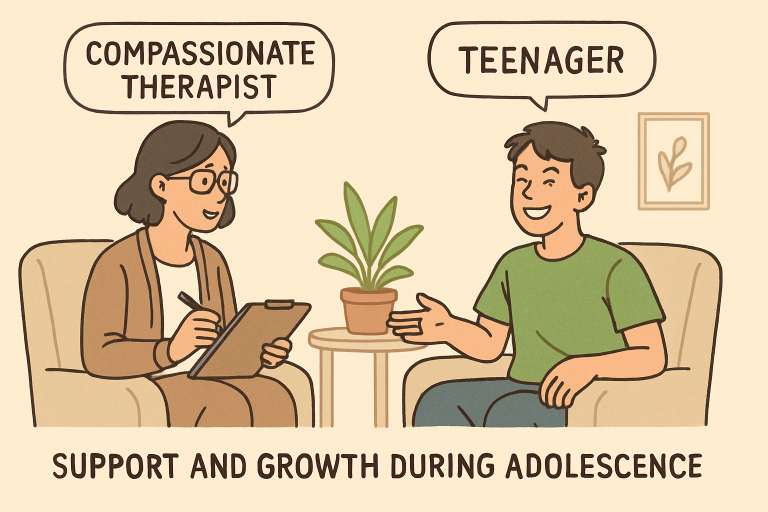Understanding the Need for Specialized Training
Adolescence is a transformative stage marked by a whirlwind of physical, emotional, and social development. As young people begin navigating the complex journey from childhood to adulthood, they encounter numerous personal and interpersonal changes that can challenge their mental health and well-being. Mental health professionals are increasingly seeking specialized training to ensure effective support during this critical period. Robust, evidence-based therapy courses have become essential tools, equipping therapists with targeted skills to address the evolving needs of young clients and their families.
The evolving landscape of adolescent mental health highlights a growing demand for expertise that goes beyond general psychotherapy. Mental health practitioners must be able to identify and respond to the myriad developmental milestones and stressors unique to teenagers — from school pressures and identity formation to social media and family dynamics. Specialized training programs address these issues head-on, providing clinicians with a solid foundation to foster resilience and healthy development in their adolescent clients.
Key Components of Adolescent Psychotherapy Training
Effective training in adolescent psychotherapy prepares professionals to deliver compassionate, research-backed care. Core elements of comprehensive training programs include:
- Developmental Psychology: Grounding therapists in adolescent growth stages, brain development, and typical behavioral patterns, allowing for a nuanced understanding of client needs.
- Therapeutic Techniques: Emphasizing evidence-based approaches such as cognitive-behavioral therapy (CBT), dialectical behavior therapy (DBT), and mindfulness interventions tailored specifically for young people.
- Family Dynamics: Highlighting the importance of family as a support system and offering tools to mediate family conflict and enhance communication.
- Cultural Competency: Promoting an appreciation for cultural, socioeconomic, and identity-related factors influencing adolescent mental health so that therapists can provide relevant and affirming care.

Integrating Technology in Training
The digital age has redefined how therapists interact with and support adolescents. Modern training programs increasingly integrate technology to meet young people on familiar ground and enhance therapeutic outcomes. Web-based learning tools, mood tracking apps, and peer support forums empower young people to play an active role in their mental health journey. These platforms are especially vital in supporting trauma-impacted youth, with expressive arts and narrative therapy merging with digital formats to facilitate self-expression and healing.
Addressing the Mental Health Crisis
Today’s adolescents are facing an unprecedented rise in anxiety, depression, and stress-related disorders — a trend that underlines the urgent need for proficient, well-prepared therapists. Initiatives like the Youth Mental Health Academy are tackling this crisis head-on by providing training and inspiring the next generation to consider careers in mental health. Early exposure to mental health careers through immersive programs helps to expand the workforce and ensure sustained, high-quality care for years to come.
Practical Experience and Supervision
Theory alone is not enough. The most effective adolescent psychotherapy courses weave supervised clinical practice into their curricula. Real-world experience under the guidance of seasoned professionals is essential for deepening understanding, building confidence, and developing the flexible thinking required for successful client outcomes. Supervision also allows trainees to reflect on their clinical practice, refine their approaches, and ensure adherence to best practices and ethical guidelines. According to the latest research summarized in Psychology Today, supervised practical experience remains one of the strongest predictors of therapist competence and client success.
Continuing Education and Professional Development
Adolescent psychotherapy is a rapidly evolving discipline. As new research and treatment modalities emerge, ongoing professional development is crucial to keeping skills sharp and knowledge current. Many training providers offer advanced workshops, webinars, and certificate programs to help practitioners stay at the forefront of evidence-based care. Engaging in lifelong learning also helps therapists navigate new challenges, such as the impact of social media, emerging behavioral health trends, and advances in teletherapy.
Final Thoughts
Investing in comprehensive training for adolescent psychotherapy is an investment in young people’s mental health and resilience. Equipping therapists with developmentally informed, culturally aware, and technologically savvy methods ensures that adolescents receive the care they need as they navigate the challenges of growth and change. As the field continues to evolve, a commitment to quality training and ongoing education will remain the cornerstone of excellent adolescent mental health support.

